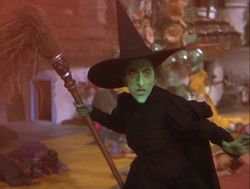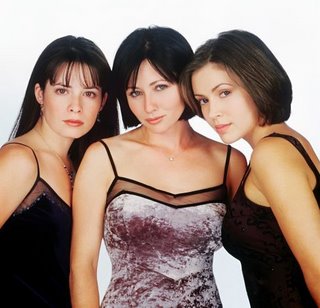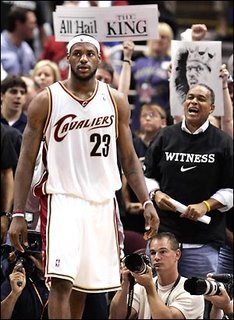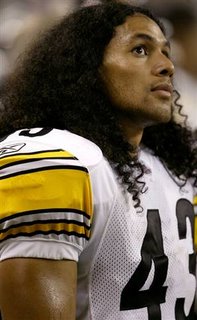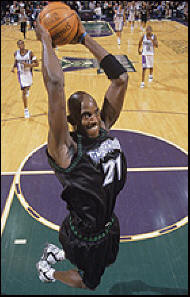Until it began its recent rotation on HBO, I missed the boat on one of the great movie comedies.
What are the great comedies, and what makes them great? My list of favorites is very short:
Animal House,
Caddyshack, the Marx Brothers'
Duck Soup,
Groundhog Day,
Risky Business, and now,
The 40-Year-Old Virgin.
I watch these movies over and over. I think I've seen
The 40-Year-Old Virgin four times in three weeks, and with
Animal House also in heavy rotation on HBO, I've watched it three times in the last month. These viewings usually happen late at night on weekends, when I come home drunk and rambunctious to see that, joy of joys, one of these movies is airing. Staying awake until 4 a.m. seems like a good choice.
These movies have common qualities. They're all about people living outside of a conventional system who are forced to fight some combination of privilege and cynicism. The short narrative: an oppressed group or person is forced into conflict. A culture clash ensues. Our protagonists win either by unleashing spectacular anarchy (
Animal House,
Caddyshack,
Risky Business,
Duck Soup) or making peace with themselves (
Groundhog Day,
The 40-Year-Old Virgin).
No one can confuse them with
The Battle of Algiers, but on some level, they're idea movies about class conflict and the path to enlightenment. They're as distant from
Ace Ventura as they are from
The Best Years of Our Lives.
Another common trait that rewards repeat viewing: Every minor character is flawlessly rendered. These movies are populated by complete people.
Groundhog Day is Bill Murray's movie, but in one short scene you understand Ned Ryerson's entire life.
Animal House and
The 40-Year-Old Virgin best exemplify this. There are probably 20 characters in
Animal House that, at different points, reward your complete attention. Marion Wormer only gets a couple of minutes of screentime, but you recognize her as a bored housewife in a loveless marriage with the authoritarian dean, an ageing hottie, a character who would be at home in a novel by Philip Roth or John Updike who only needs the slightest prompting to fuck the system by fucking a recognizably sleazy fratboy.
Why do these minor characters add so much here, while, in a movie like
American Pie, they're a forgettable, throw-away presence? When they succeed, the writers, directors and actors love their people and take the care to flesh them out. They have tics and inner lives. In
American Pie -- a movie I despise for its glibness, cruelty and cynicism -- there are no people, only vehicles that carry a mildly unamusing payoff or plot development.
Which brings me to
The 40-Year-Old Virgin. I thought it would be
American Pie, but instead it's
Groundhog Day. The admittedly lame premise is just our excuse to spend time with wonderful and recognizeable people.
Nowhere is the attention to detail more on display in the heavily-advertised scene where Andy (truly, in a just world, Steve Carell would have been nominated for Best Actor) receives a chest-waxing.
In the TV ads, this scene looked like a one-off gross-out joke, like Ben Stiller zipping his balls in
There's Something About Mary. And sure, it has that quality, but the scene is also sublime in its goofiness.
Playing the role of the beautiful loser, Andy is surrounded by his well-wishing friends as the no-nonsense Waxing Lady starts her handiwork. At first he smiles beatifically while his friends crack wise. We watch as his facial expressions transition from the naive optimist hoping for a new beginning to a hilariously pained victim. He unleashes a torrent of profanity, then is immediately embarrased at his impropriety. His pain and terror purge in hilariously nonsensical obscenities --
"Gaaaaw, suckamuck, you shitter, oh I hate you!" "Fuuuuuck me in the assho-ho-ho-hole -- wowie, I'm sorry, I really don't swear this much." "Dooooh, nipplefuck, you should burn in hell." -- that alternate with apologies, optimism and bewilderment.
Why does it rise to something better than a gross-out joke? By the time of the scene, we have a feel for Andy and his friends. The incident isn't a set-up. Carell's mood swings feel pitch-perfect, and his sympathetic but entertained friends are along for the ride.
Like my favorite comedies, every small character is a real person with likeable qualities and inner lives. Amy, the ex-girlfriend of Paul Rudd's character, is on screen for a few seconds, but she speaks credibly for every woman fed up with a guy who can't take a hint. Paula, Andy's masculine, blunt, Michael McDonald-loving boss, is at turns frightening and wholly endearing.
In the hilarious speed-dating sequence, every small character is a real person with complicated motives and histories, not just an easy-joke punchline.
It gets the small details right. Bored guys kill time by smashing burned-out fluorescent lights behind their workplace. They denigrate each others' sexual prowess while playing videogames. Catherine Keener's character has completely authentic arguments with her daughter about teenage sex.
And this is the key point: The slapstick sequences work even better because the characters' quirks and motivations are so believable. Would we give a shit about Andy's sex life, or the Faber College homecoming parade, if the filmmakers hadn't taken so much care in bringing their people to life?
Contrast this with
Swingers, a good movie, but one where Jon Favreau's loserness seems too overdrawn to be relatable, and Vince Vaughn's swagger is just a good actor having fun. I like
Swingers, and I like
Anchorman, but they're two comedies that jump at easy targets without caring about motivation.
Good comedies make the leap to greatness not just because their characters do funnier things, but because we understand
why they're doing funnier things.
I should have expected this from
Judd Apatow, whose short-lived Fox series
Undeclared was one of the best comedies ever broadcast. I think that the combination of
The Forty-Year-Old Virgin's marketing and its title led me to expect a series of half-baked jokes and a plot that would wear thin after 20 minutes.
But by the time that Apatow regular Loudon Wainwright makes his cameo appearance at the movie's conclusion, this cheerful, observant, and very funny movie has run the table and shot the moon. It could run longer than
Lord of the Rings without getting old.




